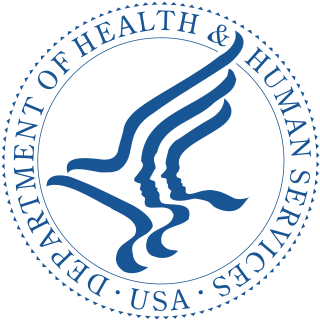
In the United States, Social Security is the commonly used term for the federal Old-Age, Survivors, and Disability Insurance (OASDI) program and is administered by the Social Security Administration (SSA). The original Social Security Act was enacted in 1935, and the current version of the Act, as amended, encompasses several social welfare and social insurance programs.

The United States Department of Health and Human Services (HHS) is a cabinet-level executive branch department of the U.S. federal government created to protect the health of the U.S. people and providing essential human services. Its motto is "Improving the health, safety, and well-being of America". Before the separate federal Department of Education was created in 1979, it was called the Department of Health, Education, and Welfare (HEW).
Supplemental Security Income (SSI) is a means-tested program that provides cash payments to disabled children, disabled adults, and individuals aged 65 or older who are citizens or nationals of the United States. SSI was created by the Social Security Amendments of 1972 and is incorporated in Title 16 of the Social Security Act. The program is administered by the Social Security Administration (SSA) and began operations in 1974.

The United States Social Security Administration (SSA) is an independent agency of the U.S. federal government that administers Social Security, a social insurance program consisting of retirement, disability and survivor benefits. To qualify for most of these benefits, most workers pay Social Security taxes on their earnings; the claimant's benefits are based on the wage earner's contributions. Otherwise benefits such as Supplemental Security Income (SSI) are given based on need.

The Department for Work and Pensions (DWP) is a United Kingdom government department of His Majesty's Government responsible for welfare, pensions and child maintenance policy. As the UK's biggest public service department it administers the State Pension and a range of working age, disability and ill health benefits to around 20 million claimants and customers. It is the second largest governmental department in terms of employees, and the largest in terms of expenditure (£187bn).

The U.S. Railroad Retirement Board (RRB) is an independent agency in the executive branch of the United States government created in 1935 to administer a social insurance program providing retirement benefits to the country's railroad workers.
Social welfare in Sweden is made up of several organizations and systems dealing with welfare. It is mostly funded by taxes, and executed by the public sector on all levels of government as well as private organizations. It can be separated into three parts falling under three different ministries. Social welfare is the responsibility of the Ministry of Health and Social Affairs. Education is the responsibility of the Ministry of Education and Research. The labour market is the responsibility of the Ministry of Employment.
Elder law is an area of legal practice that specializes on issues that affect the senior population. The purpose of elder law planning is to prepare the elderly person for financial freedom and autonomy through proper financial planning and long-term care options.
Social Security Disability Insurance is a payroll tax-funded federal insurance program of the United States government. It is managed by the Social Security Administration and designed to provide monthly benefits to people who have a medically determinable disability that restricts their ability to be employed. SSDI does not provide partial or temporary benefits but rather pays only full benefits and only pays benefits in cases in which the disability is "expected to last at least one year or result in death." Relative to disability programs in other countries in the Organisation for Economic Co-operation and Development (OECD), the SSDI program in the United States has strict requirements regarding eligibility.
Disability Determination Services, commonly called DDS, are state agencies that are funded by the US federal government. Their purpose is to make disability findings for the Social Security Administration.
The United States Social Security Administration's Ticket to Work and Self-Sufficiency Program is the centerpiece of the Ticket to Work and Work Incentives Improvement Act of 1999.

The Foster Care Independence Act of 1999 aims to assist youth aging out of foster care in the United States in obtaining and maintaining independent living skills. Youth aging out of foster care, or transitioning out of the formal foster care system, are one of the most vulnerable and disadvantaged populations. As youth age out of the foster care system at age 18, they are expected to become self-sufficient immediately, even though on average youth in the United States are not expected to reach self-sufficiency until age 26.
Disability fraud is the receipt of payment(s) intended for disabled people from a government agency or private insurance company by one who should not be receiving them, or the receipt of a higher amount than one is entitled to. There are various acts that may constitute disability fraud. These include feigning a medical problem in order to be declared disabled, exaggeration of an existing medical problem that potentially can but in reality does not render the person disabled, continuing to receive payments after having recovered from a medical problem, or continuing to receive payments while working above the allowable level for those receiving the payments.
The Pennsylvania Department of Aging is a cabinet-level agency charged with providing aid to Pennsylvania's approximately three million individuals age 60 and older. Although the bureau operates some services directly, such as the Pharmaceutical Contact for the Elderly (PACE) prescription drug program, it generally serves as a clearinghouse of funding and information for county-level Area Agencies on Aging. The department was formed under the governorship of Milton Shapp.

Bread for the City is a comprehensive front line agency serving the poor of Washington, D.C., USA. The agency began as two organizations: Zacchaeus Free Clinic, and Bread for the City, a project by a coalition of downtown DC churches created in 1974 to feed and clothe the poor. As of 2011 Bread for the City offered food, clothing, social services, legal representation and medical care without charge to eligible DC residents.
Disability benefits are funds provided from public or private sources to a person who is ill or who has a disability.
Philadelphia basement kidnapping, also known as the Basement of Horrors, describes the discovery of four people, being held against their will, in conditions of deprivation on October 17, 2011, in the basement of an apartment building in the Tacony neighborhood of Northeast Philadelphia, Pennsylvania.
This disability rights timeline lists events relating to the civil rights of people with disabilities in the United States of America, including court decisions, the passage of legislation, activists' actions, significant abuses of people with disabilities, and the founding of various organizations. Although the disability rights movement itself began in the 1960s, advocacy for the rights of people with disabilities started much earlier and continues to the present.
True Link Financial, Inc. is a San Francisco, California based financial technology firm that offers investment accounts and prepaid cards customized for seniors, people with disabilities, and people recovering from addiction. Notable investors include Y Combinator, Khosla Ventures, QED Investors, Mitch Kapor, Alexis Ohanian, Eric Ries, Initialized Capital, Matt Cutts, and Centana Growth Partners.

The Repeal of the "Implementation of the NICS Improvement Amendments Act of 2007" was legislation introduced in the United States House of Representatives on January 30, 2017 by Representative Sam Johnson of Texas. The bill repeals a rule issued by the Social Security Administration that would have required Federal agencies to identify individuals who receive disability insurance benefits under Title II of the Social Security Act or Supplemental Security Income and have been "determination by a court, board, commission, or other lawful authority that a person, as a result of marked subnormal intelligence, or mental illness, incompetency, condition, or disease: (1) Is a danger to himself or to others; or (2) Lacks the mental capacity to contract or manage his own affairs." in order to potentially prohibit such individuals from purchasing firearms or from having other purchase firearms on their behalf. The repeal was signed into law by President Donald Trump on February 28, 2017.






